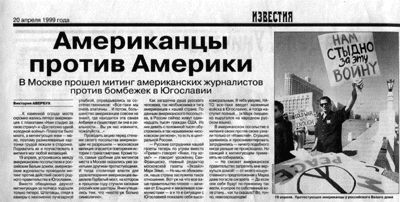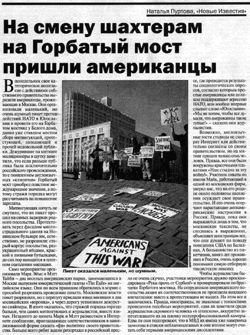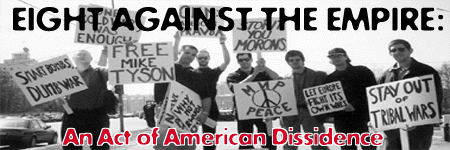
| In This Issue |
 |
| Eight Against The Empire |
| 14 More Reasons This War Sucks |
| The Enemy Within |
| Cubicle! |
| Americans Check Into Western Clinic |
| Negro Comix |
 |
 |
by John Dolan
We were late to our own demonstration: three large "American dissidents" (as Izvestiya later called us) and two dozen protest signs jammed into a tiny rustbucket taxi. We had permission from the Moscow authorities to stage a demonstration by expat Americans against the bombing of Kosovo from noon til 1:00 pm, and it was 12:06 when we pulled up at Gorbaty Most.
There was a good crowd there already--maybe thirty people. More than any of us had expected. We were protesting against against a nice war, a war even liberals can love--a war that is supported, according to the polls, by 130% of all Americans. And that percentage is rising every day, according to the docile, Soviet media of the US.
Actually, most wars are popular when they're just starting. That's why it takes guts to dissent early. It took courage to march against the war in Vietnam in 1967; a few years later all it took was fashion sense. And we were dissenting early--before the coffins started coming home to Indiana and Texas--so it was a shock to see all those people standing there. It looked like some of the Americans in Moscow were actually going to show as they'd promised.
 |
We planned to hand out the placards to the dozens of our fellow Americans who'd promised to be there. Oh, how they promised! What courage they had, on the phone! They'd sworn to show. Absolutely. But they'd lied.
We were like some expeditionary force, come ashore with armloads of rifles to distribute to the peasants, only to find that our promised uprising has failed to materialize. Our cunning American peasants were conspicuous, as the saying goes, by their absence. Maybe they were afraid if they showed, it would go down on their permanent record. Or get in the way of their precious careers. Maybe they had chicken pox. At any rate they weren't there.
A waste of a lot of great placards. Along with "AMERICANS AGAINST THE WAR" in Russian and English, there was:: "IF YOU CAN'T SPELL IT, DON'T BOMB IT," "ONE COLD WAR WAS ENOUGH," and "REMEMBER AUGUST 1914." We even had one with a big peace sign. That's how serious this thing was to us: we were willing to carry a goddamn peace-sign placard in public. We had even agreed to drop some of the less earnest slogans we'd come up with, like "DON'T MAKE ME INTO A HIPPIE" because we wanted to maintain decorum. (though we did bring the one saying "FREE MIKE TYSON." Some things you don't compromise on.)
Once we realized our fellow Americans had chickened out, the three of us each grabbed a placard and turned to face the journalists. They stopped about ten feet away. A standoff. They pointed their cameras at us. Nobody spoke. The social awkwardness was worse than an eighth-grade dance. It might've been the way Mark was facing them in black shirt and black shades, a cigarette twiching in the side of his mouth, or Matt's wide-eyed manic grin. And me, Uncle Fester in glasses. None of us looked like your average peacenik. But since the denim-and-suede crowd--Clinton, Blair, Jospin--are all for killing everything that moves in Serbia, there's nobody left to march for peace but creeps like us.
So the journalists, unable to classify what they were seeing, stared at us silently. Finally one of the Russian journalists managed to direct a question to Matt, who took that question and jammed it through the hoop in fluent Russian, speaking at 400 words a minute. Then the rest of the journalists took courage and went for closeups and interviews.
I was kind of hoping nobody'd interview me, not wanting to reveal my very shaky Russian. While the journalists swarmed around Mark and Matt, I was frantically figuring out how to say, in proper Russian, the main point I wanted to make: that Albanians and Serbs have been killing each other for centuries, and will go on doing so for several generations more, and that no naive American intervention will stop that pattern any more than we could stop it in Somalia, another culture in which inter-clan and inter-ethnic fighting is the basis of the local culture. We barge into these ancient feuds like some Quaker trying to break up a knifefight in the South Bronx. With the inevitable result: one dead peacemaker and just as many knifefights as ever.
A boy in Somalia or Pristina grows up listening to local variants of the Iliad: the story of the glorious struggle of our tribe, our clan, against the others. Then he gets a chance to live it. That's what we faced in Mogadishu: adolescent Somalis bouncing around in the back of a pickup firing bed-mounted heavy machineguns at their clan's foes, living the Iliad. Didn't that footage of a dead American soldier being dragged behind a pickup through the streets of Mogadishu (just the way Achilles dragged Hector's corpse around the walls of Troy) teach us to stay out of back-alley Iliads? Now that we're committing troops to Vlad the Impaler's old killing grounds, what will the equivalent image turn out to be--a dozen American infantrymen impaled on stakes in the traditional anus-to-mouth manner?
That was what I wanted to say if anyone interviewed me; but I kept panicking over the Russian noun "Plemya," "tribe." It's one of those damn irregular nouns ending in "ya" and I wasn't sure of the plural, not to mention the declenscion into dative or genitive. I wanted to say something like "The central feature of Balkan culture is the glorification of tribal warfare, grounded in cycles of revenge, and such a war never ends," but to say that in Russian, I'd have to put the adjective "tribal" into the genitive case, and I had no idea how to do so. So I stood there holding up my placard and whispering Russian declensions: "plemena...plemyonnii...?"
By this time we had been joined by the five other Americans who'd had the guts to show, making us a gang of eight. In other words, we'd almost tripled our numbers. Matt and Mark were propagandizing in fluent Russian for the crews from ORT and NTV, Izvestiya and Novii Izvestiya, while I talked in English to the Moscow Times, CBS and CNN. It was rather magnanimous of CNN to cover us, considering that one of our signs read "CNN: America's Pravda." (Still, if they actually showed that sign on CNN I'll eat the placard it was written on.)
Now that they'd gotten their soundbites, the jounalists began giving us their suggestions on choreographing the demonstration. First somebody with an American voice said, "I don't wanna tellya howda run yer demunstrsyshun but you'd look a lot better if ya get up there on the bridge." And damned if the bossy, insolent bastard wasn't right! We'd let the horde of journalists pen us up at the foot of the bridge, where nobody could see us. We marched up onto the crown of the bridge, with Bely Dom behind us, and the cameras loved it.
 |
So if anybody has a good protest chant against the war in Kosovo, send it to the eXile. And if we don't subject your creation to cruel parody accompanied by gross, obscene insults, we just might use it, and even--anything's possible--give you credit, rather than simply stealing it.
But even chanting wasn't cinematic enough to satisfy the journalists. They wanted action, something the video cameras could get their pixels into. So the ORT cameraman, a natural director, suggested that we march while we chanted. He seemed to feel that a proper demonstration has to have marching. There was nowhere to march but from one side of the bridge to the other in an endless loop, so we tried it. It was a big hit with the tv guys. We were now giving them the full treatment: chanting, marching, waving our placards. They ran in front of us, squatting to make us look bigger. According to friends who saw the evening news, we looked like a horde of oncoming dissident rhinos. The Eisenstein influence, I guess, the Russian filmmaker's instinct for crowd scenes.
We did about thirty laps on the crown of the bridge, wondering who was now directing this scene and when we were supposed to stop marching. When the still photographers backed off, satisfied, we slowed and finally stopped, re-forming our line across the crown of the bridge.
This seemed to be the cue for all the local streetpeople to wander up and inspect us. Two men in dirty suits with shirts hanging out and crooked ties came up and had a long look. They looked like a two-man slapstick act from a Russian circus, but they were authentic local losers, who pronounced their approval: "Molodtsi!" before shuffling off. Pro-peace they were, these two.
A tiny figure had been hovering behind me for a while, but I was trying to face the remaining cameras and could only see its shadow. Finally it moved into view: a tiny, tiny old woman with a Ho Chi Minh beard, wearing seven or eight old sweaters. She muttered some question about what we thought we were doing, then squinted at one of the Russian-language placards identifying us as "Americans against the War." She mouthed the words carefully, thought them over, and then said with great authority, "Good. What's right is right." Then she left, or rather dwindled until she was gone.
Another tv crew showed up late. The director, a small Asian with a commanding manner, had his minions lay out all the remaining placards on the cobblestones of the bridge, just in front of us, and filmed us from that angle. Then the police, who had been very discreet throughout the demonstration, politely pointed out that it was 13:00, time to quit.
It'd been a long hour on that bridge, and we felt like veterans when we stacked our placards at the foot of the bridge. Matt and Mark were already planning revenge on the spineless US expats who'd let us down, but to me the whole thing was a massive, incredible success. I've never seen that much press in one place in my life. And that's what a demonstration is about. There are demonstrations attended by hundreds of people that never get a line in the papers or a second on TV. With eight people, we'd drawn every big tv channel and most of the papers.
And it was just the start. ORT started calling us as soon as they looked at their footage of the demonstration. They wanted us on Lyubimov's interview show that evening. Seven hours after we walked onto that bridge we were on the air, talking to thirty million people. Well, to be fair, Matt talked to thirty million people. The rest of us stood beside him and tried to look staunch. I was planning to say something myself--something about the nature of tribal wars and the futility of intervening in them--but even though I'd asked several native speakers of Russian, I still couldn't be sure I was declining the noun "tribe" correctly, so I kept my mouth shut.
But more tv offers are already pouring in, and I swear to God that before this is all over I will say, on-air, something in Russian--perfectly grammatical Russian--in which I use the word "tribe" in all six cases.
As for you, my absent American cousins: you'll demonstrate all right:--when the bodies start coming back to Ohio and Louisiana and Oregon in cheap government coffins, you'll join the crowds marching against the war. You and every other play-it-safe. But you'll never stand on Gorbaty Most. There were only eight of us on the bridge that day.


